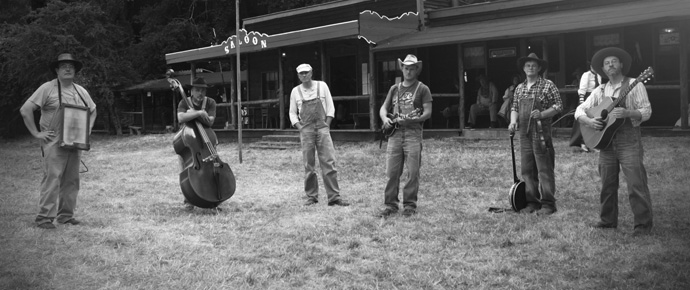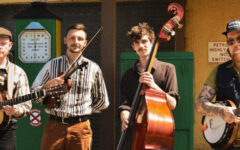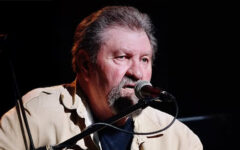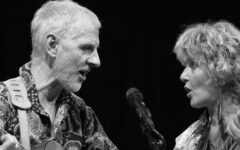
It may seem unlikely to some, but Belgium’s affinity for bluegrass is hard to deny, with six-piece The Straps helping to provide a supply.
“Our sound is a mix of bluegrass and old-time music sound,” says singer and mandolin player Sébastien De Conynck. “And it’s all applied with our own touch.”
Formed in 1995, The Straps originally consisted of four friends. Some members have come and gone over the course of the past 25 years, but De Conynck insists that the bonds of friendship remain as intact as ever. “There are six of us now,” he says. “We’re six friends from the same region who share the same passion — that of bluegrass music!”
Those six friends currently consist of De Conynck, Jean-Marie Liégeois on banjo, fiddle, vocals and guitar, Jean-Marie Giltaire, who shares the singing and guitar, harmonica player and singer Jee Bee, singer and washboard player Jean-Paul Boegen, and Jean-Jacques Druart on double bass and harmonies.
“At first, the band played a lot of Doc Watson songs, De Conynck explains. “We still play some of those songs, but over time, we’ve discovered other great artists who have influenced us as well — Bill Monroe, Lester Flatt, Earl Scruggs, Alison Krauss … We also like to play standards consisting of instrumental old-time music.”
As a Belgian-based band, they naturally mostly focus on playing at home. However they also perform regularly in bordering countries such as France and Luxembourg, in addition to a mini tour they did once in Norway.
“Unfortunately, there aren’t many bluegrass festivals in Europe,” De Conynck replies when asked about bigger venues. “The largest and best known is the La Roche sur Foron in France, and while we haven’t been there yet, we hope that we will one day. We have played a lot of country music festivals in Belgium, but there are very few bluegrass bands and bluegrass musicians here at home. Nevertheless, our bluegrass sound brings something different to the country-type festivals and audiences always appreciate that fact.”
He goes on to mention several local gatherings in particular, all based in Belgium — Cerexhe, Namur, Picnic and Hamawe Roots Festival in particular. He says that in that regard they’ve had the opportunity to share stages with a number of visiting American artists — among them, Uncle Earl, The Wilders, and Reverend Peyton’s Big Damn Band.
“Two years ago, during her last European tour, we sang a Gospel song, Just a Little Talk With Jesus, while onstage with Sierra Hull,” De Conynck says excitedly.
To date, The Straps have released two albums, the first one in 2004, Appalaches, followed by a sophomore set, No Highway To Hamawe, in 2009. “We’re impatiently awaiting the end of COVID so that we can return and record in the studio,” De Conynck adds. “The band has evolved quite a bit since the last album, and now it’s time to record a new one.”
The material is certainly varied. “We usually play originals, but with our own arrangement and our own touch,” he goes on to explain. “We also play some covers — the Beatles’ Ticket to Ride, Billie Jean by Michael Jackson, and Orange Blossom Special, which we play at the end of our sets while introducing the band. “Covers are always highly appreciated by the public.”
Not surprisingly then, he says the Straps have been very well received by the crowds they play for at home.
“We really have our own style, one that the audience really appreciates,” he remarks. “Although we attach great importance to the authenticity of our musical performances, one of our strengths is also our ability to focus on the visual element during our shows. We move a lot on stage — which is not necessarily a common occurrence with many bluegrass bands — we also bring a bit of humor to our presentation as well. We also encourage people to dance during our concerts, and we hope that in itself makes them memorable, and leaves them with lasting memories.”
That’s one of the reasons why De Conynck believes bluegrass is such a popular medium worldwide.
“Bluegrass is lively, and authentic music,” he suggests. “It’s music that’s made for sharing. People need more authenticity these days, and that’s what bluegrass brings. It’s what made bluegrass music better known here in Belgium. That’s what was shared in the film, O Brother, Where Art Thou, which was released here in 2000. When it did, it really helped that music catch on here at home.”







